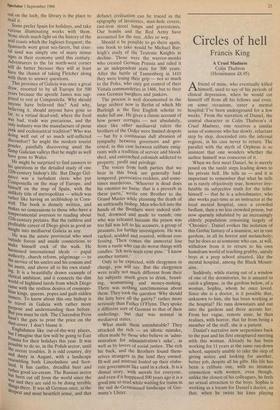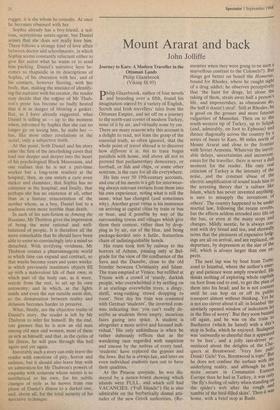Circles of hell
Francis King
A Cruel Madness Colin Thubron (Heinemann £8.95)
Afriend of mine, who eventually killed himself, used to say of his periods of clinical depression, when he would cut himself off from all his fellows and even, on some occasions, enter a mental hospital:Tve been underground for a few weeks.' From the narration of Daniel, the central character in Colin Thubron's A Cruel Madness, one receives a similar sense of someone who has slowly, reluctant step by step, descended into the infernal regions, in his case never to return. The parallel with the myth of Orpheus is so insistent that one wonders whether the author himself was conscious of it.
When we first meet Daniel, he is merely posed on the sunlit steps leading down to his private hell. He tells us and it is important to remember that what he tells us is rarely objectively true, however irre- futable its subjective truth for the teller himself — that he is a schoolmaster, who also works part-time as an instructor at the local mental hospital, once a crowded bedlam, then a no less crowded prison, but now sparsely inhabited by an increasingly elderly population consisting largely of `Chronics'. Daniel evokes the isolation of this Gothic fantasy of a mansion, set in vast gardens, in all its horror and melancholy; but he does so as someone who can, at will, withdraw from it to return to his own humdrum world of teaching grubby, unruly - boys at a prep school situated, like the mental hospital, among the Black Mount- ains.
Suddenly, while staring out of a window of one of the dormitories, he is amazed to catch a glimpse, in the gardens below, of a woman, Sophia, whom he once loved. Since she is a doctor, is it possible that, unknown to him, she has been working at the hospital? He runs downstairs and out into the gardens and there accosts her. From her vague, remote state, he then realises, with horror, that far from being a member of the staff, she is a patient.
Daniel's narrative now serpentines back to the past and his first enraptured meeting with this woman. Already he has been working for 11 years at the same run-down school, supinely unable to take the step of giving notice and looking for another, better job, despite all his gifts. His life has been a celibate one, with no intimate connection with women, even though, unlike the closest of his colleagues, he feels no sexual attraction to the boys. Sophia is working as a locum for Daniel's doctor, so that, when he twists his knee playing rugger, it is she whom he consults. At once he becomes obsessed with her.
Sophia already has a boy-friend, a ted- ious, sententious estate-agent; but Daniel senses that she does not really love him. There follows a strange kind of love affair between doctor and schoolmaster, in which Sophia seems constantly reluctant either to give her suitor what he wants or to send him packing. Daniel's narrative here be- comes so rhapsodic in its descriptions of Sophia, of his obsession with her, and of his contacts, however fleeting, with her body, that, making the mistake of identify- ing the narrator with his creator, the reader may decide that the engine of Mr Thub- ron's prose has become so badly heated that it is in danger of blowing a gasket. But, as I have already suggested, what Daniel is telling us — up to the moment when, informed by Sophia that she can no longer go on seeing him, he stabs her — has, like most other revelations in the novel, only a subjective truth.
At this point, both Daniel and his story enter the first of the interlinking caves that lead one deeper and deeper into the heart of his psychological Black Mountains, and one realises that he is not a part-time worker but a long-term resident at the hospital; then, as one enters a cave even darker and clammier, that Sophia has no existence in the hospital; and finally, that perhaps she has no existence at all, other than as a fantasy reincarnation of the mother whom, as a boy, Daniel lost to a madness even more terrible than death.
In such of his non-fiction as Among the Russians, Mr Thubron gives the impression of being the most rational and well- balanced of people. It is therefore all the more remarkable that he should have been able to enter so convincingly into a mind so disturbed. With terrifying vividness, Mr 'Thubron creates a phantasmagoric world in which time can expand and contract, so that weeks become years and years weeks: in which previously inanimate objects fill up with a malevolent life of their own; in which part of the body can, as it were, secede from the rest, to set up its own autonomy; and in which, as the lights inside and even the sun outside seem dim, so the demarcation between reality and delusion becomes harder to perceive.
What, finally, are the objective truths of Daniel's story, the reader is left by Mr Thubron to infer for himself. By the end, one guesses that he is now an old man among old men and women, most of them as sick as himself; and that, in the cycles of his illness, he will pass through this hell again and yet again.
Inevitably such a story can only leave the reader with emotions of pity, horror and sadness; but it should also leave him with an admiration for Mr Thubron's powers of empathy with someone whose nature is so antithetical to his own, for his subtle changes of style as he moves from one phase of Daniel's illness to a darker one, and, above all, for the total security of his narrative technique.











































 Previous page
Previous page